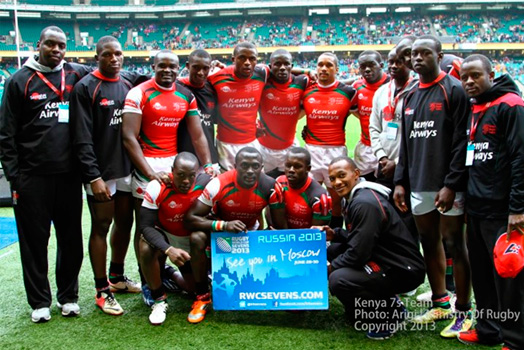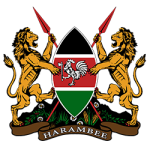Sports
Sports in Kenya are paralleled with Kenyan culture and as old as the archeological trivia of the trace of the origin of mankind. Various indigenous traditional sports have prevailed in Kenya as elements of culture and a way of life since the history of mankind. Some of the traditional games and sports prevalent in Kenya since antiquity included but not limited to, wrestling, racing exercises, stick fights, hunting (using spears and arrows), board games, bull fights, and dances.
Most modern sports in Kenya owe credit to the British colonization. Professional teams in form of clubs were formed by colonial British settlers and Asian contractors as early as 1922 before the establishment of formal schools. Sports were introduced in schools in 1925. The syllabus for teaching sport through physical training in schools (extracurricular activity) was produced in 1935. Football (soccer) and athletics (track and field) respectively were the first sports to be professionally organized.
Today, many sports are popular in Kenya, played both professionally and as recreational physical activities. Among the sports played in Kenya today include athletics (track & field and other running events), cricket, motor sports, football (soccer), rugby, volleyball, basketball, swimming and diving, handball, netball, rounder, baseball, shooting, softball, cycling, martial arts (boxing, karate, kickboxing, judo, and taekwondo), Lawn Tennis, Table Tennis, Squash, Badminton, Golf, Canoeing, Chess, Goal Ball, Horse Riding/Equestrianism, Polo, Weightlifting, Wrestling, Archery, Roller Sports, and Mountain Sports – Kenya.
Globally, Kenya is mainly known for her dominance in middle-distance and long-distance races, Rugby specially the Rugby Sevens and swimming. Kenya has also been a dominant force in ladies’ volleyball within Africa, with both the clubs and the national team winning various continental championships in the past decade
Rugby sevens world cup
Kenya rugby sevens team is on a journey to conquer its opponents and the World Cup in Moscow in July will be a realistic stage to gauge its growth level.

Alongside the World Cup, there is the 2016 Olympic Games, which Kenya intends to participate and then the Commonwealth Games in Gold Coast, Australia in 2014

At the end of the International Rugby Board (IRB) World Series in May 2013, New Zealand finished top in the overall standings with 173 points ahead of South Africa (132), Fiji (121), Samoa (104) and Kenya (99).
For the complete table check http://www.irbsevens.com/standings.html
For the complete table check http://www.irbsevens.com/standings.html
Kirui heads Worlds marathon list

Abel Kirui of Kenya gestures as he crosses the line for victory in the men’s marathon at the International Association of Athletics Federations (IAAF) World Championships in Daegu on September 4, 2011. Photo/FILE NATION MDIA GROUP
Athletics Kenya Thursday officially released the provisional national marathon team for the World Championships due August 10 to 18 in Moscow.
Defending champions Abel Kirui and Edna Kiplagat were among the athletes in the team that has six man and a similar number of women for the biennial Worlds.
Kirui , who won back-to-back 2009 Berlin and 2012 Daegu World Championships title, the 2013 Paris Marathon champion Peter Some, World 25km record holder Dennis Kimetto (2:06:50) and Mike Kipyego, the 2012 Tokyo Marathon champion, are in the team.
Bernard Kipyego and Bernard Koech wraps up the men’s team.
Also in the women’s team are London marathon champion Priscah Jeptoo the 2008 Amsterdam champ Lydia Cheromei, Lucy Kabuu, who holds the all time ninth fastest time in Marathon with her second place exploits at the 2012 Dubai Marathon of 2:19:34.
Others are Jemimah Jelagat, who won the 2013 Rotterdam Marathon in a personal best 2:23:27 in April and Margaret Akai, winner of the Daegu International Marathon in April with personal best of 2:23.28.
The team will be whittled down to four athletes in each category. Kenya is the only country that will be allowed to take four athletes in each category by virtue of having the defending champions. Each country is normally allowed a maximum of three.
Proceed to residential camp
The athletes, who will not take part in any marathon races until after the World Championships, will proceed to residential camp in Eldoret at the end of this month.
Even though Kirui, who retained his World title during the 2011 Daegu Worlds, is in the team, the selectors are keeping their fingers crossed, hoping that he will have recovered from a stress fracture in his right shin in time for Moscow.
While withdrawing from last month’s London Marathon, Kirui disclosed that he had an injury that would keep him out for some time but would assess himself ahead of the Worlds.
Kirui’s injury was diagnosed as a grade two stress fracture in his right shin that was to keep him out of six weeks. However, AK technical committee chairman, Paul Mutwii hopes that Kirui will have healed by the end of this month.
Those in the women’s team are Kiplagat and 2013 London marathon champion Priscah Jeptoo, who won silver medals during the 2011 Daegu Worlds and the 2012 London Olympic Games respectively.
Also in the team are the 2008 Amsterdam Lydia Cheromei, Lucy Kabuu, who holds the all time ninth fastest time in Marathon with her second place exploits at the 2012 Dubai Marathon of 2:19:34.




